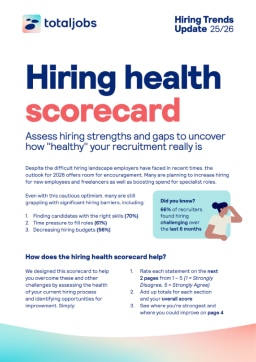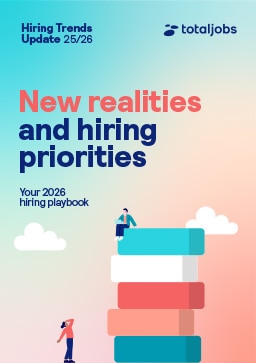
Hiring Trends Update: Key UK Labour Market Shifts and What to Expect in 2026
Table of Contents
- Current market landscape
- Top takeaways
- Market shifts and looking ahead
- In-demand skills and departments
- Preparing for 2026
- Your hiring solutions partner
- About the research

Hiring Trends Update Factsheet
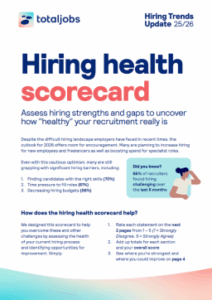
Hiring Health Scorecard
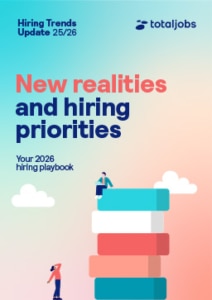
Hiring Trends 2026 Factsheet
The Hiring Trends Update is here! This new bi-annual format explores key UK labour market trends every six months, unpacking what they mean for employers and recruiters. Alongside fresh data and expert commentary, each edition comes with actionable advice to help you hire smarter, faster, and more effectively.
In this first edition, we’ve gathered insights from 900 HR leaders and 2,000 candidates in the UK, focusing on current market shifts, in-demand roles and skills, what employers can expect in 2026, and how to prepare for hiring success.
Current market landscape
The UK labour market is entering a period of transition, shaped by shifting policies, rising employment costs, and uneven demand across industries. While some sectors are adding workers, others face mounting pressures that are beginning to show in headline employment figures.

The U.K. labour market continues to weaken. The unemployment rate is now at 4.7%, up from just a little over 4% some two years ago. Following the Labour Budget in autumn of 2024, employers started to shed jobs due to the substantial increase in wage costs. Those were mostly a result of two policy decisions, the increase in the National Insurance Contribution together with yet another significant minimum wage hike. Low-profitability sectors have suffered the most with hospitality and retail losing about 100,000 payroll jobs each over the last twelve months.
Job losses have now reached a total of 140,000 since last year. While this only represents less than 0.5% in a labour market of more than 30 million people, it is nevertheless concerning.
Julius Probst, Labour Market Economist, The Stepstone Group
Top takeaways from the latest Hiring Trends Update
- 36% of businesses increased recruitment in the last 6 months
- Time to hire across industries is 8 weeks*
- 28% of businesses expect to increase recruitment in the next 6 months
- 58% of businesses say they are confident in finding the talent they need
- 56% of employers cite decreasing hiring budgets as a challenge
* As we improve our research, we’ve changed the methodology for tracking time to hire. To improve statistical accuracy, we adopted a different scale to measure it. The scale now better represents natural fluctuations. We also use the median value for enhanced accuracy.
Market shifts and looking ahead
Hiring has lost pace in recent months, with activity muted across much of the market. Yet early signs suggest the slowdown may be easing, setting the stage for a growth in 2026.

Business optimism and hiring outlook suggest that the worst is behind us and that the UK labour market will soon turn the corner. With an improved economic outlook, companies will start hiring more workers again next year.
Julius Probst, Labour Market Economist, The Stepstone Group
Catch up on our HTU webinar and watch Julius unpack the findings of our research alongside Lorraine Morrin (People Partner Lead Mid Markets at the Stepstone Group) and Victoria Swinhoe-Phelan (Business Development Director at Totaljobs)
Persistent hiring challenges
While conditions may be stabilising, the last six months have highlighted the challenges of operating in a cooling market. Employers have faced:
- Shrinking hiring budgets (56%)
- Longer time-to-hire (55%)
- Increasing pressure to meet salary and flexibility working expectations (53%)
Skills gaps also remain a significant challenge, with 58% of employers struggling to fill roles as skills requirements continue to evolve. Compounding this issue, nearly a quarter of organisations (24%) have lost existing staff to better offers elsewhere over the last six months, further tightening talent pools.
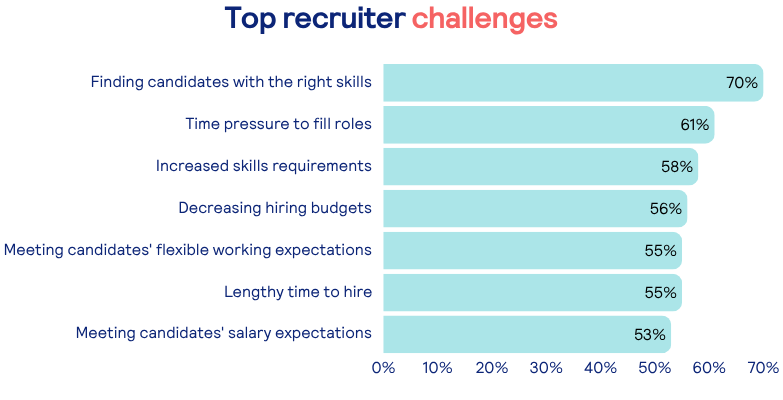
Emerging optimism
Looking ahead, many organisations are preparing to accelerate their hiring activities over the next 6 months. Beyond general optimism, with 58% of businesses confident they will secure the talent they need in 2026, we found that:
- 1 in 4 SMEs plan to increase their hiring in the next six months
- 21% of large businesses expect to engage more temporary staff and freelancers
58%
of businesses are confident of securing the talent they need in 2026
Furthermore, 19% of SMEs and 25% of large businesses intend to increase hiring investment for specialist roles, demonstrating that skills remain high on the agenda, with employers focusing on securing the expertise they need to drive growth.
Candidate perspectives and motivations
Despite this cautious optimism from employers, employee intentions still offer a mixed picture for hiring.
The majority plan to remain in their current roles for the time being while 10% are considering internal opportunities, perhaps due to many prioritising security over ambition given perceived weakness in the job market. Around one in five are open to changing their current employer, with salary (54%) remaining the most decisive factor for those seeking new opportunities, followed by:
- Work-life balance (38%)
- Job security (28%)
- Flexible working (25%)
For employers, these priorities signal where hiring strategies require attention. As the market steadies, organisations that act on these insights, investing in skills, expanding hiring activity, and responding to workforce expectations will be best placed to attract the talent they need.
Maintaining hiring health
Navigating the months ahead will require decisive action. One immediate priority for employers should be aligning their value proposition with candidate priorities.
Our research shows that competitive salaries remain critical, but so does a clear commitment to work-life balance, job security, and flexible working. These areas can be addressed in practical ways, including:
- Reviewing salaries: Regularly assess compensation to ensure offers remain competitive and reflect rising candidate expectations.
- Benchmarking against competitors: Monitor how similar organisations position themselves on salary, benefits, and working arrangements to avoid losing talent to more attractive offers.
- Embedding flexibility into company policy: Where feasible, formalise hybrid or flexible working arrangements that provide employees with greater control.
Equally important is streamlining hiring processes to avoid unnecessary delays, with our findings suggesting that lengthy time-to-hire and unclear communication have been key drivers of candidate dropouts. Employers can address this through a smoother, more candidate-friendly experience that includes:
- Easy application processes
- Effective communication throughout the process
- The use of technology to speed up screening and scheduling
- Tight interview structures
In-demand skills and departments
Our research shows that hiring demand is being driven sharply in areas where employers need specialised expertise. During the past six months, the departments businesses hired into the most were:
- Tech and IT (36%): Reflecting continued digital transformation and organisational need to invest in automation for competitive advantage.
- Customer service (35%): Organisations are prioritising service quality and client retention in a cautious economic environment.
- Operations (34%): Emphasising pressure to strengthen efficiency and delivery as businesses balance growth with constrained budgets.
Unsurprisingly when it comes to in-demand skills, technical expertise (37%) is a top priority for recruiters, while demand for soft skills (38%) such as adaptability, communication, and collaboration is equally strong. Leadership and people management (30%) also feature prominently, suggesting employers are investing in capabilities that foster resilience and agility.
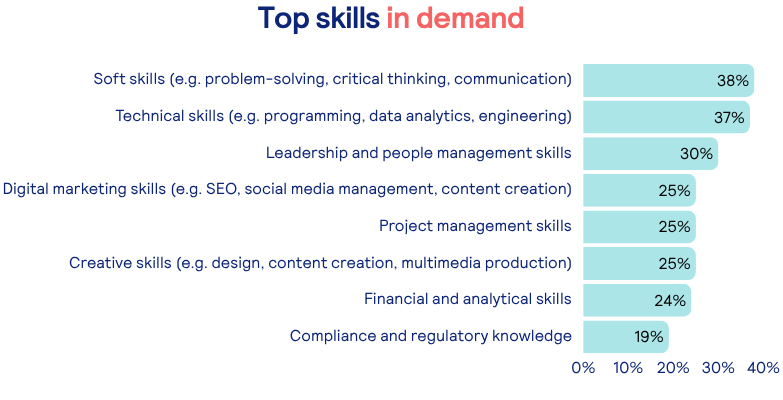
Start implementing a skills-based approach into your hiring process with our step-by-step template
Employee skill satisfaction
From the workforce perspective, most (86%) are satisfied with how their skills are utilised in their current role. This indicates that employers are doing a good job of matching candidate and employee skills, experiences, and abilities to role responsibilities.
However, employees who are unsatisfied with how their skills are being used highlight important warning signs that employers should be aware of. We found that dissatisfaction stems from:
- Limited professional development opportunities (36%)
- Repetitive work lacking challenge (31%)
- Roles where capabilities are underused (26%)
For employers, this is a reminder that attraction and retention go beyond compensation. Roles that fail to challenge and develop employees risk pushing them toward competitors when critical skills are in highest demand.
Preparing for 2026
After a challenging period, there are signs that conditions in the labour market are beginning to stabilise. To prepare effectively for the year ahead, employers need to act on the trends that are already reshaping the hiring landscape.
For example, AI adoption in recruitment is accelerating, with businesses already leveraging artificial intelligence across multiple hiring-related tasks, including:
- Job ad writing (48%)
- Managing applicant databases (40%)
- Reporting on recruitment analytics (38%)
Importantly, candidates are responding positively to this technological shift, with 59% agreeing that AI makes processes more efficient. This presents a significant opportunity for employers to simultaneously improve candidate experience while reducing the administrative burden on hiring teams.
Flexibility and fairness are also becoming non-negotiables in the hunt for talent. We found that 72% of candidates would consider leaving a job if it didn’t support flexible working, making it a key differentiator in the recruitment landscape moving forward.
Staying ahead of the competition
Our research suggests that emphasis on applicant quality, transparency, and skills-based hiring will shape how employers compete for talent in 2026. However, the real challenge will lie in turning these priorities into action.
Those who move early to adapt their strategies will be best placed to meet candidate expectations and gain an edge in the hiring landscape. This might include:
- Optimising hiring processes: Streamlining application and interview stages to reduce delays, provide faster feedback, and maintain clear communication.
- Investing in recruiter capacity: With workload management ranking as a top employer priority, organisations can now use AI to handle repetitive tasks, freeing recruiters to focus on relationship-building and candidate engagement.
- Doubling down on transparency and flexibility: Competitive pay, clear salary ranges, and flexible working arrangements are decisive for candidates, so delivering on these expectations will be essential to attracting and retaining talent.
Totaljobs – Your hiring solution partner
Work with an industry-leading hiring solutions provider that understands your challenges and can help you find the skilled talent you need.
Part of the global recruitment technology company, The Stepstone Group, Totaljobs is a cutting-edge recruitment solutions partner whose goal is to find the right job for everyone. Find the right people for your business by reaching wider talent pools, increasing your brand’s visibility, and maximising your hiring budget.
About the research
The Hiring Trends Update is a bi-annual piece of research that checks the current pulse of the recruitment market. We surveyed 900 HR professionals and 2,000 UK candidates between 3rd-5th of September. All responses were collected online and the candidate survey is representative of the UK population by gender and age.
Frequently asked questions
What are the main challenges employers face in 2025?
Employers in 2025 have faced tighter recruitment budgets, persistent skills shortages, and longer hiring times across many sectors. Rising salary expectations also added pressure, as candidates seek roles that reflect market rates and inflation. Furthermore, balancing cost control with competitive offers and an efficient hiring process has become a key challenge for most organisations.
What is the average time to hire in the UK?
The average time to hire in the UK is around eight weeks, though it can be longer for specialist or senior roles. Factors such as skills gaps, multiple interview stages, and lengthy approval processes contribute to delays. Employers looking to reduce this time are focusing on faster decision-making, clearer job briefs, and smarter recruitment technology.
What motivates candidates to change jobs?
Salary remains a top motivator for job moves, but candidates also prioritise work-life balance, flexibility, and job security. Many professionals seek employers who offer hybrid working, strong career development opportunities, and a positive culture that supports wellbeing.
How can employers prepare for hiring in 2026?
Employers can prepare for the year ahead by aligning pay and benefits with market expectations, promoting flexibility, and strengthening their employer brand. Investing in technology to streamline hiring and offering training to bridge skills gaps will also help attract and retain talent in a competitive market.
Explore articles
Receive the latest recruitment resources and
advice to boost your hiring
By providing us with your details you agree to our privacy policy and for us to keep you updated with the latest news, events,
and special offers from Totaljobs.





